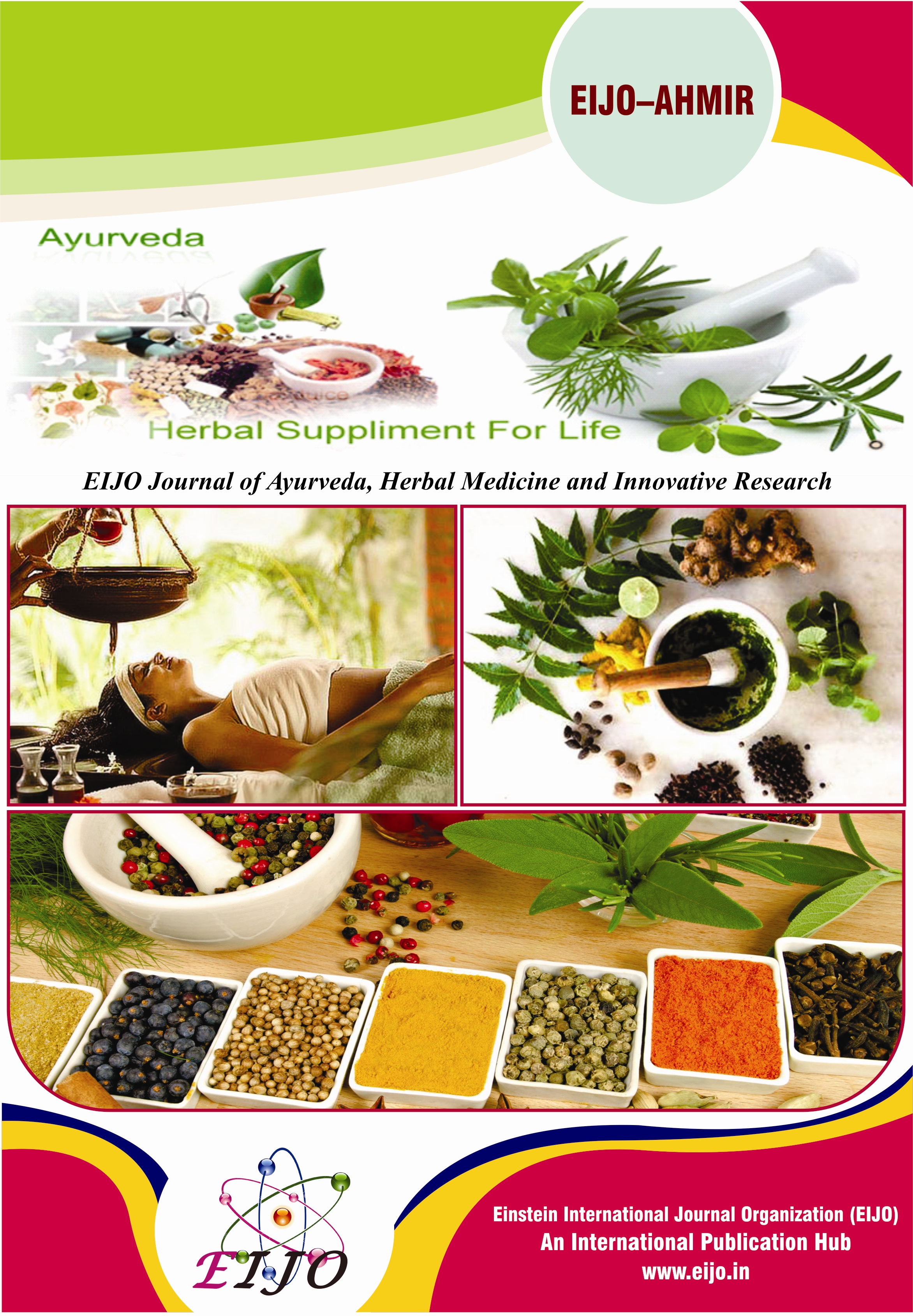JOURNALS || EIJO Journal of Ayurveda, Herbal Medicine and Innovative Research (EIJO – AHMIR) [ ISSN : 2456 - 530X ]
Yoga is extensively rehearsed as a means to promote physical, cerebral and spiritual well- being. While a number of studies have proved the efficacy of yoga for performing in healthy individualities and those passing illness or pain. We propose an analogue between the physical, cerebral and spiritual goods of practice as espoused in yoga traditions. To this end, we present a composition a to Study the effectiveness of yoga on Physical, Mental, and Emotional Well- being of individualities, which may give suggestions regarding the possible mechanisms of action of yoga upon well- being. Physical systems actuated through yoga practice include musculoskeletal, cardiopulmonary, autonomic nervous system and endocrine functioning. Cerebral benefits include enhanced managing, tone efficacy and positive mood. Spiritual mechanisms that can be understood within a Western medical model include acceptance and aware mindfulness. We present empirical substantiation that supports the involvement of these disciplines. Still, fresh well- conducted exploration is needed to further establish the efficacy of yoga for health countries, and to understand how posture, breath and pensive exertion affect the body, mind and spirit.
Keywords: Yoga, Health Physical, Mental, Emotional Well-Being.
- Patanjali (2003) The Yoga Sutras of Patanjali. Dover publications.
- Sandlund ES & Norlander, T: The effects of Thai Chi Chuan relaxation and exercise on stress responses and well-being: An overview of research. Journal of stress management 2000,7:139-149
- Lundberg U & Melin, B.: Stress in the development of musculoskeletal pain. In Avenues for the prevention of chronic musculoskeletal pain and disability Edited by: Linton S. Amsterdam, Elsevier Science; 2002:165-179
- Collins C. Yoga: Intuition, preventive medicine, and treatment. J Obstet Gynecol Neonatal Nurs. 1998;27:563–8.
- Desikachar K, Bragdon L, Bossart C. The yoga of healing: Exploring yoga's holistic model for health and well-being. Int J Yoga Ther. 2005;15:17–39.
- Marlatt GA. Buddhist philosophy and the treatment of addictive behavior. Cogn Behav Pract. 2002;9:44–50.
- Kolasinski SL, Garfinkel M, Tsai AG, Matz W, Dyke AV, Schumacher HR. Iyengar yoga for treating symptoms of osteoarthritis of the knees: A pilot study. J Altern Complement Med. 2005;11:689–93.
- Lavey R, Sherman T, Mueser KT, Osborne DD, Currier M, Wolfe R; The effects of yoga on mood in psychiatric Impatients. Psychiatric rehabilitation journal 2005, 28(4):399-402.
- Ray US, Mukhopadhyay S, Purkayastha SS, Asnani V, Tomer OS, Prashad R, Thakur L, Selvamurthy W; Effects of yogic exercises on physical and mental health of young fellowship course trainees, Indian J Physiol Pharmacol 2001, 45(1):37-53.
- Cowen VS & Adams, T.B: Physical and perceptual benefits of yoga asana practice: results of a pilot study. Journal of Bodywork and Movement Therapies 2005, 9:211-219
- Hoffman JW, Benson H, Arns PA, Stainbrook GL, Landsberg GL, young JB, Gill A: Reduced sympathetic nervous system responsivity associated with the relaxation response. Science 1982, 215(4529):190-192.
- World Health Organization (2014) Mental health: a state of wellbeing.
- Bhatia M, Kumar A, Kumar N, Pandey RM, Kachupillal V, EEG study, BAER study. p300 study; Electrophysiologic evaluation of Sudarshan Kriya: an EEG, BAER, P300 study. Indian J Physiol pharmacol 2003, 47(2):157-163.
- Sharma H, Sen S, Singh A, Bhardwaj NK, Kochupillai V, Singh N: Sudarshan Kriya practitioners exhibit better antioxidant status and lower blood lactate levels. Biological psychology 2003, 63(3):281-291.
- Pilkington K, Kirkwood G, Rampes H, Richardson J: Yoga for depression: the research evidence. Journal of affective disorders2005, 89(1-3):13-24
- Parshad O: Role of yoga in stress management. The West Indian medical journal 2004, 53(3):191-194.
- Krishnamurthy MN, Telles S (2007) Assessing depression following two ancient Indian interventions: effects of yoga and ayurveda on older adults in a residential home. J GerontolNurs33:17-23.
- Janakiramaiah N, Gangadhar BN, Murthy PJNV, Harish MG, Subbakrishna DK, et al. (2000) Antidepressant efficacy of SudarshanKriya Yoga (SKY) in melancholia: a randomised comparison with elctroconvulsive therapy (ECT) and imipramine. J Affect Disorder. 57:255-259.
- Sharma VK, Das S,Mondal S, Goswampi U, Gandhi A (2005) Effect of Sahaj Yoga on depressive disorders. Indian J PhysiolPharmacol49:462-468.
- Chong CS, Tsunaka M, Tsang HW, Chan EP, Cheung WM. Effects of yoga on stress management in healthy adults: a systematic review. Altern Ther Health Med. 2011; 17(1):32-38.



